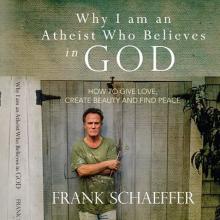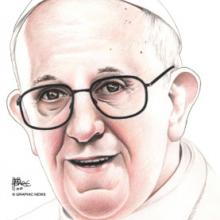nonbelievers
One phrase comes to mind, time and again, when I think of Frank Schaeffer: “THINK AGAIN.” Any time I think I have a handle on things theological, he seems to find the thread, hanging from the edges, and gives it a good, solid yank.
Such is the case once again with his newest book, Why I am an Atheist Who Believes in God: How to give love, create beauty and find peace. Just when it seems the delineations between theism and atheism, between believers and nonbelievers, is sufficiently clear, Schaeffer blurs even those lines, leaving us to wonder what it is any of us actually believes and why.
Frank Schaeffer is not one to deconstruct theology (or even the lack thereof) with some kind of sadistic joy, leaving us to sort through the pieces. Rather he explores what I might call trans-theism, offering us practices, a vocabulary, and a worldview that take us far beyond belief toward a deeply human – and yet inexplicably transcendent – experience.
I asked Frank several questions about his new project; here is what he had to say.
Secretary of State John Kerry brought his argument for a two-state Israeli-Palestinian peace to the annual AIPAC conference this week, and whatever else we might know, we know this: Many evangelical Christians didn’t like it.
Or at least that’s what we’re told by some Christian leaders and their political allies. Supporting Israel’s government by opposing compromise with the Palestinians is a permanent plank in American evangelical political thought. “God told Abraham that he would bless those who bless him and the nation of Israel,” the thinking goes, “and curse those that curse Israel.”
But could it be that the truth is more complicated?
What if the loudest evangelical voices don’t represent the complexity of our community? I raise these questions as an evangelical who is fully committed to supporting the struggle for security, dignity, and freedom for Israelis and Palestinians. And I’m not alone.
Is Pope Francis endorsing heresy?
It might look that way from the eye-catching headlines this week that made it appear everyone was bound for heaven — “even atheists!” — thanks to Jesus’ death on the cross.
The passage that prompted the reports came from Francis’ brief homily at the informal morning Mass that he celebrates in the chapel at the Vatican guesthouse.
Speaking on Wednesday, Francis said that as human beings created in the image of God, everyone has a “duty to do good.”
“The Lord has redeemed all of us, all of us, with the Blood of Christ: all of us, not just Catholics. Everyone! ‘Father, the atheists?’ Even the atheists,” he said, answering his own query. “Everyone! And this blood makes us children of God of the first class! We are created children in the likeness of God and the blood of Christ has redeemed us all!”
Cue the jaw dropping and head scratching. Atheists were pleasantly surprised, conservative Catholics were dazed and confused, and the pope’s comments raced around the Internet; for a while they were the second-most shared piece on Reddit.
So was Francis preaching a form of “universalism?" That is the unorthodox teaching that says, essentially, that all faiths are equal and all are going to heaven, especially if you are nice to people here on earth. It’s also a heresy that Francis’ predecessor, Benedict XVI, spent a career quashing every time he thought he thought he spied a hint of it in some theologian’s writings.
Uncertainty about the existence of God is not the same thing as certainty about the non-existence of God.
I’ve enjoyed taking part in the “Subverting the Norm” conference this weekend with many of the forefront thinkers in what has been called “Radical Theology.” Although the word “radical” has sensationalist connotations for lots of people, it really just means a theology that isn’t firmly rooted. I know that in itself sounds scary to some folks, but the radical theology camp might suggest that fear stems from an addiction to certainty.
A billboard bearing a positive message about atheism has been vandalized — again.
A billboard posted in Chico, Calif., that originally read “Don’t believe in God? Join the club” was defaced on Dec. 12, less than a week after it appeared, with vandals removing the word “don’t.”
The billboard was one of 12 purchased this month by a local chapter of the United Coalition of Reason (UnitedCoR), a national organization that works to unite small, local groups of atheists and other freethinkers.
They are the latest in a long line of billboards erected by atheist groups to draw ire, both locally and nationally. Every national freethought organization that has purchased billboards or bus advertisements in the last five years has reported some form of vandalism or protest.
If the billboards attract negative attention, criticism, and vandalism, why do atheists — a group that polls repeatedly rank among the least-liked group in America — buy them? Are they worth the money and the ill will they cost the groups that buy them?
[Editor's Note: David Niose is president of the American Humanist Association and vice president of the Secular Coalition for America, a group that lobbies on behalf of nontheist and secular Americans. In his new book, “Nonbeliever Nation: The Rise of Secular Americans,” he charts the development and growth of the religious right and what he sees as the increasingly organized response from Americans who are committed to the separation of church and state. Some answers have been edited for length and clarity.]
Q: You write about the 1912 presidential election as one in which all four candidates were sympathetic to evolution, science and religious skepticism. Today, a presidential candidate favors evolution at his or her peril. What’s changed?
A: What has changed is the environment of politics, particularly the level of political discourse. Thanks to the rise of the religious right, many candidates today actually emphasize their anti-intellectualism as a selling point to voters. Conservative Christians have always been part of the voter pool, of course, but only in recent decades have they been organizing and flexing their muscle as a voting bloc. Many candidates get mileage by pandering to conservative religion, by openly rejecting science and emphasizing their biblical literalist views.
Thousands of atheists and nonbelievers will gather this Saturday (March 24) on the National Mall in Washington for the "Reason Rally," a daylong event featuring speakers, music and comedy to promote secular values.
The goal of the event is to "unify, energize and embolden secular people nationwide," said Jesse Galef, a Reason Rally spokesman.
"For this many of us to come together is hopefully a sign of things to come," Galef said. "Greater organization, greater cooperation and greater awareness nationally of who we are."
Organization and participation within the secular movement is growing. Atheists held their first mass gathering on the National Mall in 2002, with "The Godless March on Washington," an event that attracted 2,000 participants, according to news reports at the time. As many as 30,000 people are expected to attend this year's event.
LONDON — Christianity is waning in England and could be outnumbered by nonbelievers within 20 years, according to a new study.
The study conducted by the British Parliament showed there were 41 million Christians in Britain, down nearly 8 percent since 2004. Meanwhile, the number of nonbelievers stood at 13.4 million, up 49 percent over the same period.
Researchers at the House of Commons Library concluded that Christianity had declined to 69 percent of the population while those with no religion increased to 22 percent.
"If these populations continue to shrink and grow by the same number of people each year," the study said, "the number of people with no religion will overtake the number of Christians in Great Britain in 20 years."







